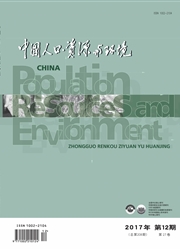

 中文摘要:
中文摘要:
经济发展中的虚拟水贸易实施受到多种要素的影响与制约。在回顾当前虚拟水研究进展的基础上。从自然、经济、社会、生态、技术和政策六个维度系统分析了以农产品为主要载体的虚拟水贸易实施的影响因素,进而收集32个典型的虚拟水贸易实施国家的横截面数据,利用多元逐步回归的方法,以虚拟水对外依赖程度为因变量,对部分影响因素进行了实证检验,并根据实证结果从资源优化配置与区域经济贡献的角度解释了国内学者研究得出的我国区际问农产品虚拟水的流动格局。研究表明:耕地资源及水资源的稀缺程度、区域经济发展水平、社会调适能力是虚拟水进口的正向驱动因素,而农业用水效率则是虚拟水进口的逆向驱动因素。
 英文摘要:
英文摘要:
The implementation of virtual water trade in economic development is influenced by many factors. Based on the current research progress of virtual water, this paper made an a systematic analysis on the driving factors of virtual water flow in agricultural products trade from natural, economic, social, ecological, technical and policy aspects. And then, collecting the cross-sectional data of 32 nations typical in implementation of the virtual water trade in agriculture, using multiple stepwise regression method and taking the dependence on the import of virtual water as the external variables, this paper made an empirical test on the part of influencing factors. Finally, according to empirical results, from two angles of the resources optimal allocation and regional economic contribution, the paper explained the formation of virtual water flows pattern of agricultural products in China drawn by the perspective of scholars. The research found that: the scarcity degree of arable land and water resources, regional economic development level and the social adaptation ability were the positive driving factors of virtual water import. While, the agricultural water use efficiency was the reverse driving factor of virtual water import.
 同期刊论文项目
同期刊论文项目
 同项目期刊论文
同项目期刊论文
 Research on Energy Conservation and Emission Reduction Based on the Economic Transformation and Upgr
Research on Energy Conservation and Emission Reduction Based on the Economic Transformation and Upgr 期刊信息
期刊信息
